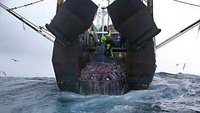
The study published in Science a few days ago, in which an international team of scientists warns that all global fisheries will have collapsed by 2047 if current fishing practices continue, has obviously had an impact.
I have read a good editorial about it yesterday for example in El País, the leading newspaper in Spain (the country that is still largely driving the EU's fishing policy). I have also read good pieces in Le Monde , the Financial Times and the New York Times.
But whether governments will immediately take notice remains to be seen.
I read recently that according to the UN's Food and Agriculture Organization (FAO), Governments (read: we) are subsidizing the fishing industry with US $ 54 Billion per year, the majority of which are environmentally destructive; the World Bank estimates fisheries subsidies between 15 and 20 Billion per year; I read another estimate of 30-34 Billion per year, and WWF uses the figure of 15 Billion. The discrepancy reflects the difficulty in tracking subsidies, including indirect subsidies, and the lack of transparency which often goes with them. Nevertheless, whatever way you look, it's always a lot of billions (with a b), the majority for destructive purposes. Eliminating them would thus make a lot of sense.
The UN General Assembly's decision on the long awaited moratorium on high seas bottom trawling later this month will also be a good opportunity to test political will.
And of course, it will be interesting to see what the European Union Fisheries Ministers make of scientists' recommendations when they decide next year's fishing quotas.
Like so many environmental issues, this one requires a combined response from politicians and consumers. In order to make consumers' response real, we need more tools like Fishonline and Seaweb's Seafood Choices Alliance.
But these tools must be adapted to the diets, tastes and traditions of key fish consuming countries.
No comments:
Post a Comment